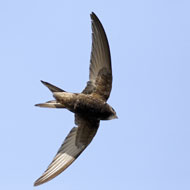Public urged to provide homes for swifts

Swifts arrive in the UK late April-May.
The RSPB is calling on the public to help provide new homes for swifts, as figures show the birds' numbers have fallen to less than half what they were 20 years ago.
Swifts arrive in the UK late April-May and can spend up to three months in the country. The RSPB attributes the birds’ decline to modern buildings, which lack the nooks and crannies they need to build nests.
While some house builders have agreed to integrate swift homes into new buildings, the RSPB believes more can be done to help this incredible bird. 'Just, 1,000 additional new nest boxes could make a difference’, the charity said.
'If you’re having a building constructed or renovated, there’s also the option of the ‘swift brick’. This replaces a standard house brick and can easily be installed by a builder.’



 The Federation of Independent Veterinary Practices (FIVP) has announced a third season of its podcast, Practice Matters.
The Federation of Independent Veterinary Practices (FIVP) has announced a third season of its podcast, Practice Matters.